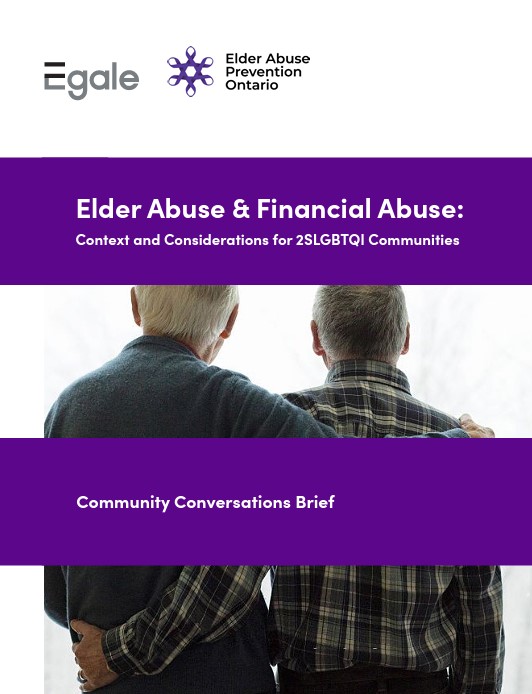 While there is increasing attention to elder abuse including financial elder abuse within 2SLGBTQI communities, there has been minimal research to date. There are no known prevalence and incidence studies regarding elder abuse or financial elder abuse of 2SLGBTQI older adults. (...) Further research and critical conversations about elder abuse including financial abuse in 2SLGBTQI communities is needed to better understand how financial elder abuse is experienced, its underlying causes and tensions, and to identify what community needs and wishes are. Innovative approaches are also needed to build community bridges, increase knowledge and education about elder abuse, tackle ageism, decrease barriers to accessing services, and ultimately to prevent elder abuse and financial elder abuse.
While there is increasing attention to elder abuse including financial elder abuse within 2SLGBTQI communities, there has been minimal research to date. There are no known prevalence and incidence studies regarding elder abuse or financial elder abuse of 2SLGBTQI older adults. (...) Further research and critical conversations about elder abuse including financial abuse in 2SLGBTQI communities is needed to better understand how financial elder abuse is experienced, its underlying causes and tensions, and to identify what community needs and wishes are. Innovative approaches are also needed to build community bridges, increase knowledge and education about elder abuse, tackle ageism, decrease barriers to accessing services, and ultimately to prevent elder abuse and financial elder abuse.
Source: Egale Canada
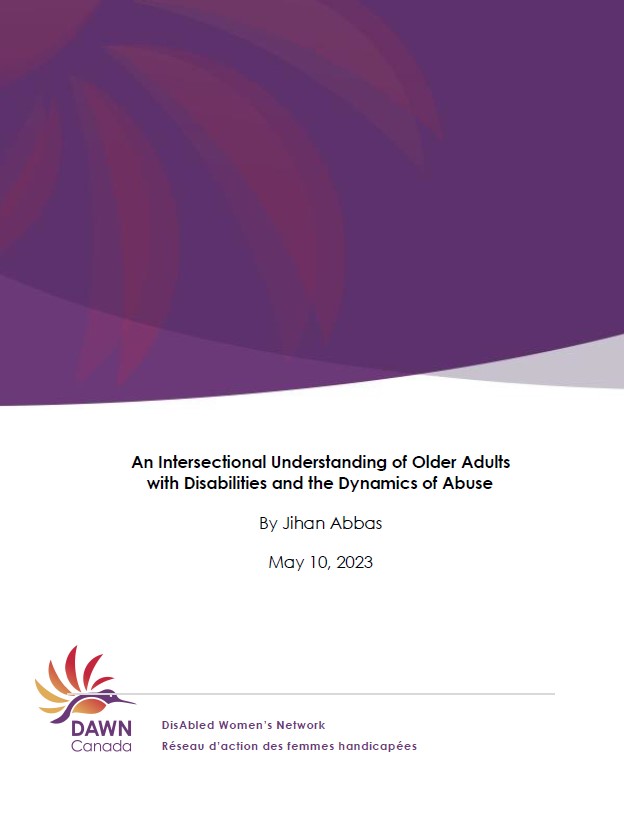 This report expands awareness of the intersections of elder abuse and disability, with an emphasis on financial abuse. This funding opportunity, provided through NHSP, allows DAWN to build on an existing body of work and research in the area of violence and abuse, and identify priority areas for future research. This report includes a review of key research, existing tools and resources for public education and prevention, and tangible next steps for DAWN to carry out post-report to further advance work at the intersections of age, disability, and abuse, as well as other intersecting identities. This report serves as the needs assessment portion of the project which will inform existing gaps, awareness needs, and practical tools and resources for stakeholders.
This report expands awareness of the intersections of elder abuse and disability, with an emphasis on financial abuse. This funding opportunity, provided through NHSP, allows DAWN to build on an existing body of work and research in the area of violence and abuse, and identify priority areas for future research. This report includes a review of key research, existing tools and resources for public education and prevention, and tangible next steps for DAWN to carry out post-report to further advance work at the intersections of age, disability, and abuse, as well as other intersecting identities. This report serves as the needs assessment portion of the project which will inform existing gaps, awareness needs, and practical tools and resources for stakeholders.
Source: DisAbled Women's Network (DAWN)
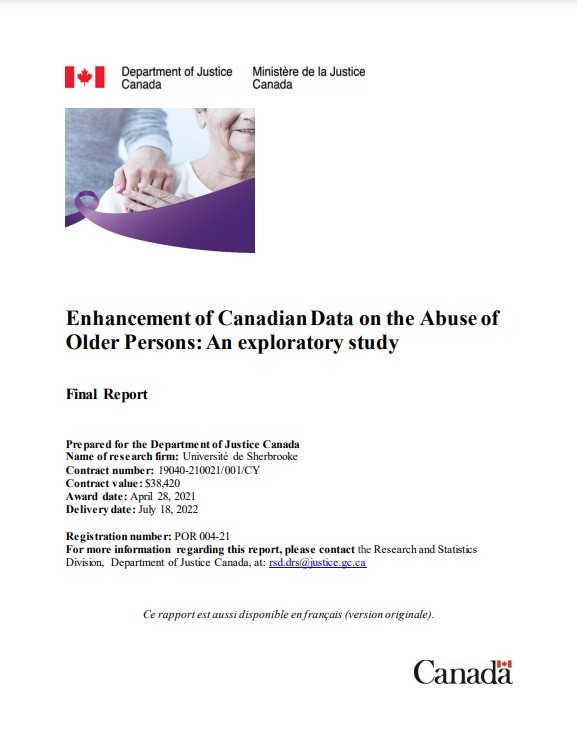 This public opinion research report presents the results of a review of scientific literature, individual interviews with Canadian and international researchers as well as representatives of Canada’s provincial and territorial governments, and a group interview with members of the Canadian Network for the Prevention of Elder Abuse, conducted by the Université de Sherbrooke on behalf of the Department of Justice Canada. Interviews were conducted between June 2021 to July 2021, and then from November 2021 to March 2022.
This public opinion research report presents the results of a review of scientific literature, individual interviews with Canadian and international researchers as well as representatives of Canada’s provincial and territorial governments, and a group interview with members of the Canadian Network for the Prevention of Elder Abuse, conducted by the Université de Sherbrooke on behalf of the Department of Justice Canada. Interviews were conducted between June 2021 to July 2021, and then from November 2021 to March 2022.
"Although it has been studied since 1970, combatting abuse of older persons poses numerous issues and challenges around the world in terms of how it is defined, measured or tracked and given priority in policy, and in terms of practices recognized to be effective. This Canadian exploratory study sought to explore the feasibility of filling national data gaps in the area of abuse of older persons in effort to respond to the Minister of Justice and Attorney General of Canada’s mandate letter commitment to improve data collection on “elder abuse”. The study has four specific objectives that were contractually agreed upon between the University of Sherbrooke and the Department of Justice Canada (contract value = $38,420) :
1) to obtain information on the challenges and gaps in data collection on abuse;
2) to document the differences between abuse and neglect in data collection;
3) to design pragmatic approaches to successful research/data collection; and
4) to identify important data points to collect on the mistreatment of older persons.
The results of this study will help further our knowledge and understanding of the data gaps in the production of data on abuse of older persons, and provide up-to-date scientific elements to inform decision-making."
Source: Justice Canada and Research Chair on Mistreatment of Older Adults
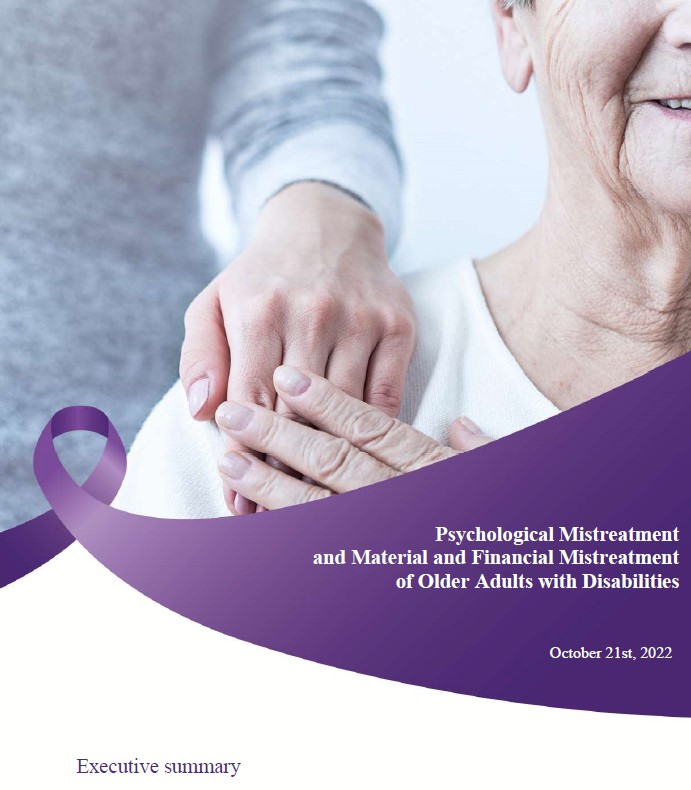 ''Even though the field of countering mistreatment of older adults has seen development for fifty years, research that clearly links “mistreatment”, “older adults” and “disabilities” are rare. Even rarer are the works that give a voice to older adults with disabilities who went through mistreatment, so they can talk about their experiences and speak about their services trajectory.
''Even though the field of countering mistreatment of older adults has seen development for fifty years, research that clearly links “mistreatment”, “older adults” and “disabilities” are rare. Even rarer are the works that give a voice to older adults with disabilities who went through mistreatment, so they can talk about their experiences and speak about their services trajectory.
From 2019 to 2022, research was conducted with the goal of academically and practically documenting the psychological mistreatment as well as the material and financial mistreatment ofolder adults with disabilities, which classifies them as disabled in Québec. It was done with the intention to contribute to the understanding of a problem by relying on experimental material. This research concretizes the 49th measure of the Governmental action plan to counter mistreatment of older adults 2017-2022. It has three objectives: review the pool of knowledge based on the scientific literature, describe situations of mistreatment and services trajectory in the light of statements from older adults with disabilities, and elaborate recommendations. Each of these objectives is clearly stated in this summary. This work was possible due to the meeting and the participation of people from the University research community, social workers from the Health and social services network (RSSS) and community organizations, as well as associations or groups of disabled people (see Annex 1).''
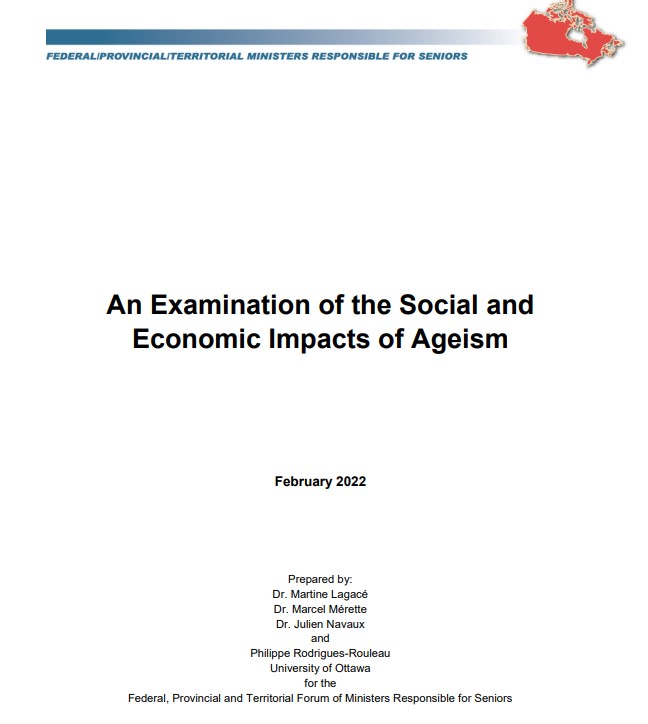 "Ageism is “the stereotyping, prejudice and discrimination against people on the basis of their age” (World Health Organization [WHO], 2019). As the number of older adults in Canada continues to grow, it is important to address ageism, document its negative effects, educate Canadians about these effects and find ways to counteract it. Promising initiatives are underway, including campaigns from the World Health Organization (WHO) and the European Union (EU). There is a need for further action, especially in Canada, as ageism remains the only type of discrimination perceived as acceptable and socially tolerated (Ayalon & Tesch-Römer, 2018).
"Ageism is “the stereotyping, prejudice and discrimination against people on the basis of their age” (World Health Organization [WHO], 2019). As the number of older adults in Canada continues to grow, it is important to address ageism, document its negative effects, educate Canadians about these effects and find ways to counteract it. Promising initiatives are underway, including campaigns from the World Health Organization (WHO) and the European Union (EU). There is a need for further action, especially in Canada, as ageism remains the only type of discrimination perceived as acceptable and socially tolerated (Ayalon & Tesch-Römer, 2018).
This report examines social and economic impacts of ageism through a review of literature to better understand:
- the impacts of ageism related to employment, health and health care, social inclusion, safety and security, media and social media
- initiatives to counteract age-based discrimination against older adults
Sources include academic and non-academic documents (produced by governments and organizations that represent or support older adults) published between 2014 and 2019, available in French or English. Of 346 relevant documents reviewed, 258 are discussed (136 relating to impacts and 122 relating to initiatives). Most documents relating to the impacts of ageism stem from scholarly publications, and the psychosocial impacts of ageism are far more documented than economic impacts. Most studies on the impacts of ageism relate to health, health care, and employment. There has been a marked increase in the number of large empirical studies in the last 5 years."
Source: Federal/Provincial/Territorial Ministers Responsible for Seniors Forum
Page 2 of 20

















